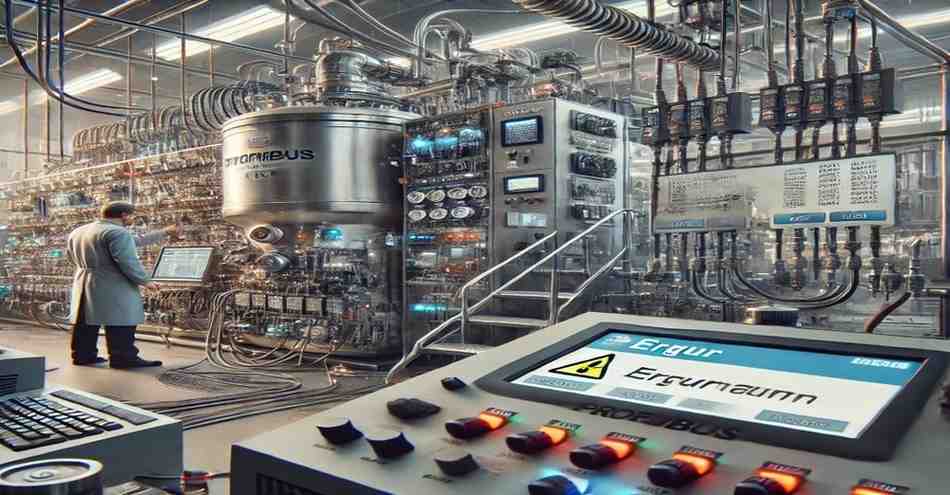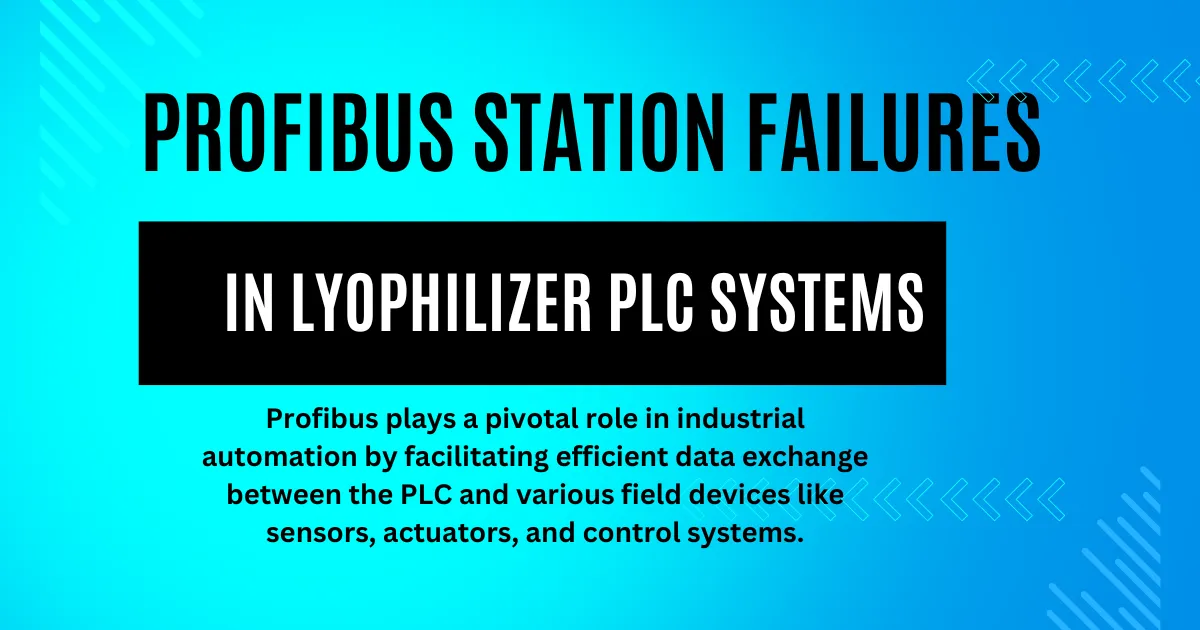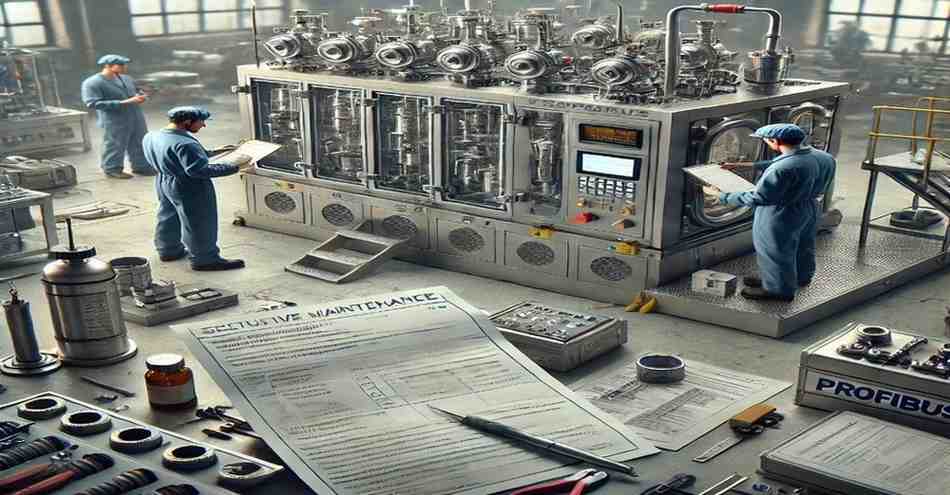Table of Contents
ToggleProfibus Station Failures in Lyophilizer PLC Systems: Causes, Solutions, and Maintenance Tips
Profibus Station Failures in Lyophilizer ,When dealing with industrial automation, especially in sophisticated systems like lyophilizers, ensuring seamless communication between different components is crucial. One common issue encountered is the failure of a Profibus station in the lyophilizer’s PLC (Programmable Logic Controller). This article will delve into what a lyophilizer is, the role of Profibus in such systems, and the common causes and solutions for Profibus station failures.

Understanding Profibus in Lyophilizer PLC Systems
To fully grasp the issue, it’s essential to understand the components and their interplay within the system. Profibus, short for Process Field Bus, is a standard for fieldbus communication in automation technology, enabling devices from different manufacturers to communicate. In a lyophilizer PLC, Profibus stations are critical for the seamless operation of the freeze-drying process.
What is a Lyophilizer?
A lyophilizer, or freeze dryer, is a device used in various industries, including pharmaceuticals and food processing, to preserve perishable materials by removing water through sublimation. The process involves freezing the material, reducing the pressure, and then adding heat to allow the frozen water in the material to sublimate
Role of Profibus in Industrial Automation
Profibus plays a pivotal role in industrial automation by facilitating efficient data exchange between the PLC and various field devices like sensors, actuators, and control systems. This ensures precise control and monitoring, which is critical in processes requiring high reliability, such as lyophilization.

Common Issues in Profibus Stations
Despite its robustness, Profibus systems can experience failures, especially in harsh industrial environments. Understanding these issues helps in diagnosing and resolving them effectively.
Internal Errors in Profibus Stations
One major category of problems involves internal errors within the Profibus station itself. These can be due to firmware glitches or hardware failures.
Firmware Glitches
Firmware glitches can arise from bugs in the software running on the Profibus station. These issues may cause the station to behave unpredictably or fail to communicate properly with the PLC
Advanced Troubleshooting Techniques for Profibus Failures
While basic troubleshooting steps can resolve many issues, sometimes more advanced techniques are necessary to address persistent or complex problems. Understanding these methods can help in efficiently diagnosing and fixing Profibus station failures in lyophilizers.
Analyzing Profibus Communication Logs
Communication logs can provide a wealth of information about the interactions between the Profibus stations and the PLC. By analyzing these logs, you can identify patterns or recurring errors that may indicate underlying issues. Specialized software tools can help interpret these logs, offering insights into potential problems and their causes.

Signal Quality Assessment
Signal quality plays a crucial role in the reliable operation of Profibus networks. Poor signal quality can lead to intermittent communication failures. Using tools like oscilloscopes or dedicated Profibus testers, you can measure signal strength, noise levels, and timing errors. This data can help pinpoint issues such as electromagnetic interference (EMI) or faulty cables affecting signal integrity.
Checking Network Configuration and Settings
Incorrect network configuration or settings can also cause communication issues. Verify that all devices on the Profibus network are correctly configured, including addressing, baud rates, and termination settings. Ensure that the network topology adheres to Profibus standards and all devices are properly integrated.
Investigating Environmental Factors
Environmental factors such as temperature, humidity, and electromagnetic interference can impact the performance of Profibus stations. Ensure that the lyophilizer and its components are operating within the recommended environmental conditions. Implementing proper shielding and grounding techniques can help mitigate the effects of EMI
Replacing and Upgrading Components
Sometimes, the most effective solution is to replace or upgrade components. Older Profibus stations or cables may not perform as reliably as newer ones. Upgrading to newer, more robust hardware can enhance the reliability and performance of the Profibus network. Additionally, using higher-quality cables and connectors can reduce the likelihood of physical damage and connection issues.
Leveraging Manufacturer Support and Resources
Manufacturers of Profibus components often provide valuable support and resources, including detailed technical documentation, troubleshooting guides, and firmware updates. They can offer specific recommendations based on their extensive knowledge and experience with their products.
Preventive Maintenance for Long-Term Reliability
In addition to troubleshooting and resolving existing issues, implementing a preventive maintenance plan is crucial for ensuring the long-term reliability of Profibus stations in lyophilizers.
Scheduled Maintenance Checks
Establish a schedule for regular maintenance checks of the Profibus network. This should include inspecting cables, connectors, and power supplies, as well as testing signal quality and communication logs. Regular maintenance can help identify and address potential issues before they lead to failures.
Training and Education
Ensure that the personnel responsible for maintaining and troubleshooting the Profibus network are well-trained and knowledgeable. Regular training sessions and access to up-to-date resources can help them stay informed about the latest best practices and technologies.
Documenting Issues and Solutions
Maintain detailed records of any issues encountered and the solutions implemented. This documentation can be invaluable for future troubleshooting efforts, providing a reference for similar problems and their resolutions.
Proactive Component Replacement
Replace components such as cables, connectors, and power supplies before they fail. Proactive replacement, based on the expected lifespan and wear indicators, can prevent unexpected downtime and ensure continuous operation.
Conclusion of Profibus Station Failures in Lyophilizer
Profibus station failures in lyophilizer PLC systems can be a significant challenge, impacting the efficiency and reliability of freeze-drying processes. By understanding the common causes of these failures and implementing advanced troubleshooting techniques, preventive maintenance, and leveraging manufacturer support, you can minimize downtime and maintain optimal performance. Ensuring that your Profibus network is well-maintained and updated is key to avoiding disruptions and achieving reliable operation in industrial automation systems.
Summary: This failure message appears if one of the Profibus-Station fails. The causes of this failure could be: internal error in the station, no connection to the bus, and no power supply at the Profibus-Station.
FAQs OF Profibus Station Failures in Lyophilizer
Can environmental factors affect Profibus station performance?
Yes, environmental factors such as temperature, humidity, and electromagnetic interference can significantly impact the performance of Profibus stations. Ensuring optimal environmental conditions and proper shielding can mitigate these effects.
How often should preventive maintenance be performed on Profibus networks?
Preventive maintenance should be performed regularly, with the frequency depending on the operating conditions and criticality of the system. A typical schedule might include monthly inspections and annual comprehensive checks.
What should be included in a Profibus network maintenance checklist?
A maintenance checklist should include inspecting cables and connectors, verifying power supply stability, checking signal quality, updating firmware, and ensuring proper network configuration and settings.
What are the benefits of upgrading to newer Profibus components?
Upgrading to newer Profibus components can enhance network reliability, improve performance, and reduce the likelihood of failures. Newer components often come with improved designs and better resistance to environmental factors.
How can I access support and resources from Profibus component manufacturers?
Most manufacturers provide support through their websites, including technical documentation, troubleshooting guides, and contact information for customer support. Reaching out to them directly can provide specific guidance and solutions tailored to their products. |

